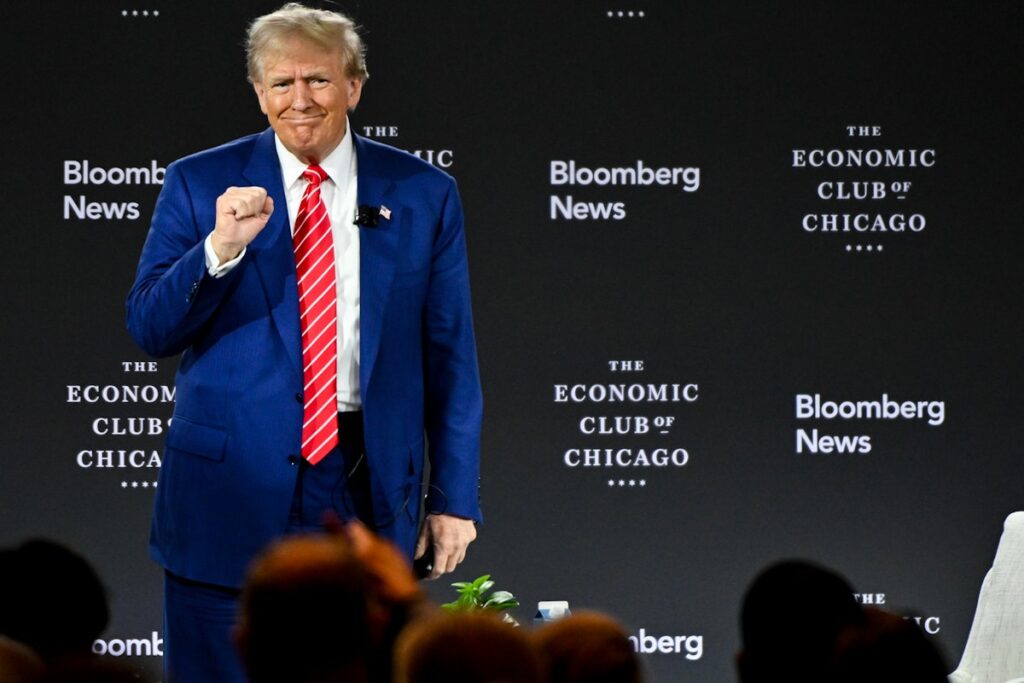Donald Trump’s recent interview at the Economic Club of Chicago showcased his struggles to effectively articulate his policies to a business-savvy audience, straying off-topic and offering vague responses in the face of direct questioning. The event, moderated by Bloomberg’s chief editor John Micklethwait, was designed to comprehensively address various critical issues, including immigration, tariffs, corporate dissolution, foreign policy regarding Taiwan, and the country’s outlook after the upcoming election. However, Trump appeared ill-prepared and unable to provide substantial answers, resulting in a disjointed performance that left attendees visibly frustrated.
During the conversation, Trump’s 200 percent tariff proposal on foreign cars prompted audible groans from the crowd and revealed his difficulty in defending the economic implications of his policies. Micklethwait aptly highlighted a financial assessment indicating that Trump’s agenda could escalate the federal deficit by $7.5 trillion, more than double the total associated with Vice President Kamala Harris. Rather than engaging with the criticism, Trump resorted to nebulous claims regarding his initiatives, asserting that his administration would revitalize American manufacturing while dismissing the fiscal consequences of his plans.
Micklethwait’s attempts to penetrate Trump’s rhetoric were met with defensiveness, as Trump boasted of his handling of the pandemic and branded tariffs as crucial for American companies. The moderator pressed Trump on the limited fiscal returns from his proposed tariffs, which were estimated at about $200 billion—a figure that paled in comparison to the costs of his promises. Trump’s reluctance to substantiate his claims and his unyielding stance created an atmosphere of tension, not only between him and the moderator but also amid the audience.
As criticism mounted, Trump deflected Micklethwait’s inquiries, especially regarding trade relations with China, where Trump’s misinterpretation of existing trade data became evident. The former president’s inability to accept factual corrections led to further embarrassment, as Micklethwait provided clear data-supported insights. This friction escalated when Trump disparaged respected financial publications like The Wall Street Journal and dismissed Micklethwait’s credibility, which only intensified the skepticism surrounding Trump’s economic rhetoric.
The discussion also ventured into the realm of labor, where Trump made controversial statements about the skills required for autoworkers at foreign car manufacturing plants, asserting that many could complete assembly tasks with little training. This dismissive commentary not only alienated those within the industry but also showcased Trump’s tendency to oversimplify complex labor issues. His responses indicated a troubling disconnect from the realities faced by American workers and the intricacies of the automobile manufacturing sector.
Finally, when faced with questions regarding antitrust actions against Google, Trump evaded specifics regarding the tech giant, opting instead to divert the discussion toward voter registration issues in Virginia. This remarkable deflection exemplified his struggle to stay on topic, further illustrating his ambiguous relationship with technology and digital platforms. Such exchanges not only underscored Trump’s inadequacies in addressing critical contemporary issues but also marked a significant departure from the focused economic discourse expected from a candidate vying for the presidency. Overall, the Economic Club interview starkly revealed Trump’s broader challenges in captivating and convincing a politically and economically savvy audience.

